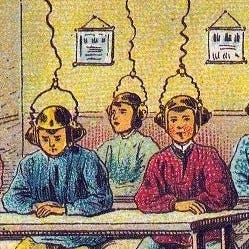My first semester of futures and foresight is over! 5 stars, would eat here again. At the beginning of the semester, I really had no firm idea what the field of futures was but was pretty sure it was something I needed to learn. Now I feel like I have a good handle on the field, as well as being acquainted with many of the leading voices. Consider me adequately introduced!1 It's daunting remembering that I'm only 10% done, but I'm committed to taking advantage of the process and the opportunities along the way, rather than try to rush it or only look forward to after I graduate.
As the semester progressed, my understanding of foresight has developed by accretion. At this point, I think of it as the study of how to increase imagination and agency with respect to the future. I went really in-depth about how the course assignments accomplished this in my final essay; I considered reposting it in this newsletter, but it reads a little bit “class paper”, so I’ll just link it here in case you’re interested (not much in it should surprise anyone who has been reading this newsletter from the beginning, though I think some of the synthesis is pretty good).
One of the most exciting parts of the course was getting to spend quite a bit of time learning from a real life futurist. Dr John Sweeney2, our instructor, comes from the Manoa school and has done futures work all over the world, including for large non-profits like International Red Cross and Red Crescent, and in conflict zones. Rather than using a textbook, we were taught with a combination of seminal papers in the field and examples from real futures engagements, many of which Dr Sweeney helped to create. This meant he was able to answer questions about how the process really works, and give examples of what kinds of topics or issues were raised but didn't make it into the final report due to the political dynamics of the engagement. This blend of teacher and practitioner really appeals to me in such a practice-focused field, and is very different from anything I experienced in my economics Masters program - some professors had done consulting work or served as expert witnesses, but the classes were firmly about theory, not praxis. I found Dr Sweeney engaging, thoughtful, and a good example of the kind of intense and indiscriminate curiosity that I am starting to believe is a professional requirement for the field.
I recently found out that Portland State University offers a graduate certificate in foresight, and I briefly wondered if I was in the right place. After looking through the courses and reflecting on my semester, I'm confident that Houston is the best program for me - the degree plan is really compelling, the remote element really works for me, and the connections I'm making are a great group of present and future futurists from across the country (and even beyond).
Unfortunately, Dr Sweeney has the bad Google luck of not being the most famous person with his name, falling behind an investigative journalist, an AFL-CIO president, a carpenter who dismembered two women, and a guy who got slightly less than 1% of the vote in the Democratic primary for Governor last year in my own state of Oregon (though this last one may have just been Google personalizing results).



